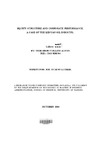| dc.description.abstract | This study examines the effects of ownership structure on corporate performance of
Kenyan oil sector firms between 2001-2005. Ownership structure is defined along two
dimensions: ownership concentration and ownership mix. These two categories
incorporate both the influence power of shareholders as well as the identity of owners
with their unique incentive mechanisms and preferences. In this study, the ownership
structure is considered in terms of (i) foreign Vs Local ownership, (ii) Government Vs
Non Government ownership, and (iii) Institutional Vs Individual ownership. This study
uses (accounting) profitability (i.e., Return on Capital Employed (ROCE)) as measures of
performance. The study adopts a multi-theoretic approach to investigate the impact of
diverse shareholders on the performance of emerging economy oil firms.
Overall, the findings confirm that there is a positive association between foreign
ownership and firm performance. The study shows that domestic corporations positively
influence firm performance although not at the same magnitudes as for foreign
corporations. Nevertheless, the result assumes significance only if domestic corporations
hold large blocks of shares, which enhances their monitoring abilities and incentives
Also, it is found that firms with Institutional ownership do not perform better than those
with Individual ownership in Kenys, A less significant relationship is found for
Government Ownership.
The study recommends inward FDI is an essential element to introduce a new way of
thinking, stimulate competition, and catalyze necessary reform. Inward FDI helps move
the Kenyan economy a step towards substantial reform. Considering the possibility of
market failures, there are good reasons for the government to conduct inward FDI
promotion policies. | en |

